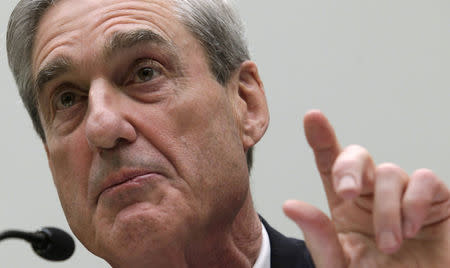U.S. top court rebuffs mystery company in Mueller subpoena fight
By Lawrence Hurley WASHINGTON (Reuters) - The U.S. Supreme Court on Monday refused to hear a bid by an unidentified company owned by a foreign government to contest a grand jury subpoena related to Special Counsel Robert Mueller's now-completed inquiry into Russia's role in the 2016 election, though the justices' action does not force the firm to comply. A federal judge imposed a $50,000-per-day fine against the company, which had asked the justices to hear its appeal of a December appeals court ruling that upheld a judge's decision to hold it in contempt for refusing to fulfill a document request made in the subpoena. The company already could owe more than $3 million. The Supreme Court rejected the appeal in a brief order with no noted dissents from any of the nine justices. Mueller submitted a confidential final report on his findings to U.S. Attorney General William Barr on Friday. On Sunday, Barr said Mueller did not find a conspiracy between Trump's campaign and Moscow. A spokesman for Mueller's office said the case involving the subpoena will now be overseen by the U.S. Attorney's Office in Washington. The case has remained a high-profile mystery, with the Supreme Court and lower courts declining to identify the company, the country that owns it or the specific purpose of the subpoena. The company, which has a U.S. office, has said it was a witness, not a suspect, in Mueller's investigation. Court papers detailing its legal arguments were made public but all information about specific facts of the dispute were redacted. The subpoena was issued last July. The Supreme Court in January refused to put the lower court ruling on hold. According to court filings, the daily fine imposed by U.S. District Court Judge Beryl Howell started accruing on Jan. 15. Such fines accrue until the grand jury is no longer sitting. It is unknown whether this grand jury has completed its work. The legal question was whether the company is protected under the Foreign Sovereign Immunities Act, a law that allows foreign countries to avoid lawsuits in U.S. courts. The law does not cover commercial activities. The company argued that this law protects it not just in civil cases but also in criminal cases. The company also argued that foreign governments are immune from contempt findings in U.S. courts. On behalf of Mueller's office, Solicitor General Noel Francisco, the Trump administration's top Supreme Court lawyer, had asked the justices not to take up the case, deeming the lower court rulings correct. Mueller charged a series of Russian individuals and three Russian companies. The conviction of former Trump campaign chairman Paul Manafort involved his concealment from U.S. authorities of millions of dollars he was paid as a consultant to pro-Russia Ukrainian politicians. Mueller neither concluded that Trump unlawfully sought to obstruct the probe, nor did he exonerate him of obstruction. Trump denied collusion and obstruction. Russia denied interfering in the election. (Reporting by Lawrence Hurley; Additional reporting by Sarah N. Lynch; Editing by Will Dunham)


